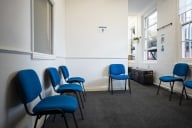You have /5 articles left.
Sign up for a free account or log in.
Most colleges and universities have been poised on a razor's edge this fall, closely monitoring campus and local COVID-19 data and a wealth of other metrics to decide whether to change their approach to in-person instruction or other campus behavior. Some have changed their original plans -- and some have done so more than once.
Monday brought more changes, in both directions.
Four more colleges -- Brevard College, the College of Wooster, Iona College and the University of New Haven -- said they would suspend in-person instruction for a week or more in response to rising COVID case counts.
Brevard officials cited a third positive test on one athletic team for their decision Saturday to not only quarantine that team and suspend residential visitation but also -- "out of an abundance of caution" -- to shift all classes to an online modality this week.
Administrators at Wooster said Sunday that the Ohio institution would move to virtual instruction for a week, cancel all sports practices and bar in-person meetings of any kind. They attributed the decision to a total of 10 positive cases since Thursday, which "seem to be related to two clusters of individuals with connected living and social circles, rather than to broader community transmission."
Wooster's president, Sarah Bolton, said the move was particularly difficult after "two months of very good campus public health."
Iona, in New York, said Sunday that its decision to shift to virtual learning for two weeks followed a spike to 58 cases drawn from about 800 tests conducted after surveillance testing identified an uptick on certain athletic teams.
The president, Seamus Carey, said that "contact tracing indicates that the virus was transmitted through a single isolated event and is not indicative of a broader spread on campus." An article in the Rockland/Westchester Journal News on Monday said that the number of cases had spiked to 65 and that "98 percent of the positive cases" involved athletes.
At the University of New Haven, President Steven Kaplan said an increase in new positive cases, to 105 from 92 the week before, would result in a pivot to remote learning this week.
Acknowledging how "trying" the coronavirus has been on students and employees, Kaplan said the university would have a class-free “recharge day” tomorrow, in response to a suggestion from the student government.
Reversals in Colleges' Fall 2020 Reopening Plans
Scores of colleges and universities have in recent weeks changed the plans they set last spring for reopening their physical campuses this fall. This tracker and searchable database shows how those changes have unfolded over time.
"I hope everyone will use this day to relax and rejuvenate yourself for the remainder of the fall semester," he said.
Those institutions are among a steady and growing wave of colleges that have suspended in-person learning in recent weeks, as seen in Inside Higher Ed's tracker of reversals of fall reopening plans.
As those campuses were moving to more online learning, two major universities that themselves had pivoted to virtual learning last month began bringing students back to the physical classroom on Monday.
The University of Arizona said it would bring about 1,500 students more to campus this week than last, following several weeks of diminished in-person instruction. "This is lower than our initial estimate of about 2,500 students because students and their instructors had the opportunity to evaluate what they wanted and, in the spirit of shared governance, make collective decisions about how to proceed at this point," President Robert Robbins said. "There are many, many students who want that in-person interaction and many professors who want that in-person interaction, but, obviously, there are people who don't want it, so we've given them the option."
San Diego State University, meanwhile, today began offering "an additional but limited number of in-person courses … primarily upper-division or graduate level determined by faculty and academic leaders to be essential to student degree completion, licensure, and career preparation."
-- Doug Lederman
A custodian at Drury University, in Missouri, has died of COVID-19, a local newspaper reported.
The Springfield News-Leader said that LeeRoy Rogers, senior lead custodian, had died after being hospitalized with the virus. The university's president, Tim Cloyd, told students and employees Monday that "the staff member we previously informed you was hospitalized due to COVID-19 has died," the newspaper said. Cloyd send condolences to Rogers's family and urged students to seek counseling "in times of grief and anxiety such as this … In honor of LeeRoy, please continue to take care of yourselves and one another."
A Drury spokesman said that "to the best of our knowledge," Rogers did not contract COVID on the university's campus.
-- Doug Lederman
Like most colleges, the University of New Hampshire has devoted considerable resources to telling students what they should do (and not do) to prevent the spread of COVID-19. But The Concord Monitor reports that for the past two weeks, staff and faculty have had 104 positive cases, while students have had 91 cases.
Erika Mantz, a spokeswoman for the university, couldn’t say why the university has seen a spike of positive COVID-19 cases in faculty and staff.
“While any positive COVID case is a concern, the university is identifying more positive cases as a result of its regular testing of all community members, not just those with symptoms,” she said.
-- Scott Jaschik








